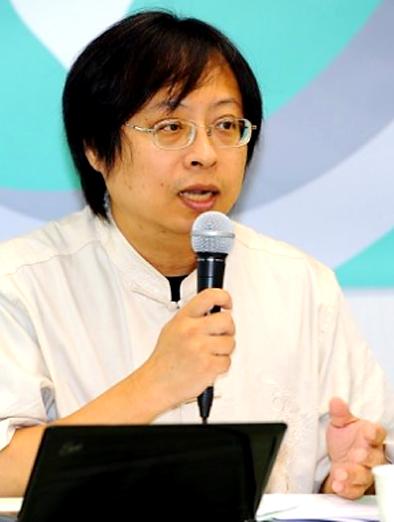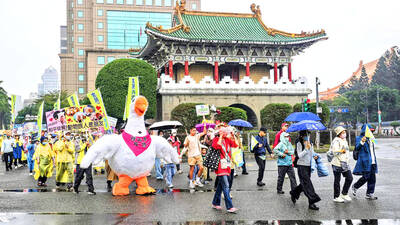A Taiwanese academic scheduled to attend an international seminar in Hong Kong commemorating the 25th anniversary of the Tiananmen Square Massacre was turned away by Hong Kong customs officials early on Friday, with the customs official claiming to have been informed by Beijing that the academic’s entry permit had been annulled.
Tseng Chien-yuan (曾建元), an associate professor of public administration at Chung Hua University and a board member of the New School for Democracy, said he boarded a late-night plane bound for Hong Kong on Thursday, planning to attend a seminar held by the Hong Kong Alliance in Support of Patriotic Democratic Movements in China.
“At customs [in Hong Kong], they said they needed to examine my files and later told me that there are problems with my entry permit. At about 3:30am it was confirmed that I could not enter the city,” Tseng said.

Photo: Taipei Times
Emphasizing that his entry permit, the Mainland Travel Permit for Taiwan Residents, will not expire until the end of this year and that he did not plan to go to the mainland, Tseng said he asked the customs officers for the reason he was denied entry, but received ambiguous answers.
“Customs said they did not know the reason, but only knew that the notification of my permit being revoked was from Beijing,” Tseng said.
“It was curious to hear from the Hong Kong official, when I asked whether I was blocked because of the sensitive timing of the visit [with June 4, the anniversary of the Tiananmen Square Massacre, approaching], that the denial of entry was not necessarily associated with June 4, as, he told me, many people are also turned away in non-sensitive times [without justified reasons],” he said.
Tseng understood the remarks to imply that the Chinese government has started to tighten its grip on border control in Hong Kong, a city claimed by Beijing to be self-governing under the “one country, two systems” model.
Despite the Hong Kong official’s denial that the refusal of entry had anything to do with the bloody crushing of the 1989 student-led movement centered on Beijing’s Tiananmen Square, Tseng said that his permit was not recalled physically nor stamped. He said he has no idea whether he has been blacklisted for good or denied entry only this time.
Tseng said he believes this incident has done great harm to the city’s image of operating under rule of law and democratically.
“The spirit of the so-called ‘one country, two systems’ principle has vanished completely,” he said.
The New School for Democracy, an NGO that hosts courses and forums on freedom and democracy, in a statement yesterday denounced the incident and urged the Hong Kong authorities to provide a reasonable justification and take compensating measures, “otherwise the city’s status as an international free port and a global financial center could be tarnished.”
“Beijing has long been violating international law by restricting blacklisted democracy advocates’ visits to Hong Kong, but [Tseng] might be the first Taiwanese citizen, with legal and effective traveling documents, to be denied entry,” the statement said.
It called on the Taiwanese government to protest the violation of its national’s civil rights and request an explanation from Hong Kong immediately, lest the case open the floodgates for future political intervention by Beijing in the civil interaction between Taiwan and Hong Kong.
Two students who participated in the Sunflower movement and who traveled with Tseng successfully crossed the border. They were invited to share their experiences at the student movement, Tseng said.
Hong Kong Secretary of Security Lai Tung-kwok (黎棟國) on Friday said he could not comment on individual cases, but that officers had to turn away those who did not meet “relevant requirements.”
Meanwhile, pro-democracy Hong Kong Legislator Lee Cheuk-yan (李卓人) said that Tseng’s rejection was a worrying extension of the bans already placed on former student leaders of the Tiananmen Square protests, such as Wang Dan (王丹) and Wuer Kaixi.
“But this time it’s more outrageous. Even a Taiwanese academic is not allowed in. It’s affecting Hong Kong’s international image,” Lee said.
Additional reporting by AP

NUMBERS IMBALANCE: More than 4 million Taiwanese have visited China this year, while only about half a million Chinese have visited here Beijing has yet to respond to Taiwan’s requests for negotiation over matters related to the recovery of cross-strait tourism, the Tourism Administration said yesterday. Taiwan’s tourism authority issued the statement after Chinese-language daily the China Times reported yesterday that the government’s policy of banning group tours to China does not stop Taiwanese from visiting the country. As of October, more than 4.2 million had traveled to China this year, exceeding last year. Beijing estimated the number of Taiwanese tourists in China could reach 4.5 million this year. By contrast, only 500,000 Chinese tourists are expected in Taiwan, the report said. The report

Temperatures are forecast to drop steadily as a continental cold air mass moves across Taiwan, with some areas also likely to see heavy rainfall, the Central Weather Administration (CWA) said. From today through early tomorrow, a cold air mass would keep temperatures low across central and northern Taiwan, and the eastern half of Taiwan proper, with isolated brief showers forecast along Keelung’s north coast, Taipei and New Taipei City’s mountainous areas and eastern Taiwan, it said. Lows of 11°C to 15°C are forecast in central and northern Taiwan, Yilan County, and the outlying Kinmen and Lienchiang (Matsu) counties, and 14°C to 17°C

STEERING FAILURE: The first boat of its class is experiencing teething issues as it readies for acceptance by the navy, according to a recent story about rudder failure The Hai Kun (海鯤), the nation’s first locally built submarine, allegedly suffered a total failure of stern hydraulic systems during the second round of sea acceptance trials on June 26, and sailors were forced to manually operate the X-rudder to turn the submarine and return to port, news Web site Mirror Daily reported yesterday. The report said that tugboats following the Hai Kun assisted the submarine in avoiding collisions with other ships due to the X-rudder malfunctioning. At the time of the report, the submarine had completed its trials and was scheduled to begin diving and surfacing tests in shallow areas. The X-rudder,

DEMAND: The government should enact regulations in line with Austria and Germany to incorporate vegan nutrition into school meals, an advocate said More than 1,000 people yesterday marched in Taipei to promote veganism, calling for legislation to incorporate vegan diets into school lunches and the national net zero emissions program. Participants gathered on Ketagalan Boulevard in front of the Presidential Office Building for the march, which was organized by the Vegan Action Network (VAN). Former ambassador to Chad Chiu Chung-jen (邱仲仁), actor Yankee Yang (楊子儀) and actress Cindy Lien (連俞涵) attended the event. VAN member Marianne Chao (趙梅君) said that the campaign aimed to urge the government to promote vegan diets across schools and government agencies via legislation and national policies, which would help build